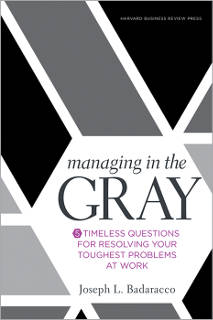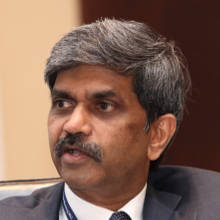Managing in the Gray: Five Timeless Questions for Resolving Your Toughest Problems at Work
By Joseph L Badaracco
In his book ‘Managing in the Gray’, HBS ethics professor Joseph L Badaracco presents a framework to arrive at the best possible decisions in a hard situation
D ShivakumarBy Joseph L Badaracco

Joseph Badaracco is professor of ethics at Harvard Business School. He teaches leadership, strategy and corporate responsibility.
Grey areas are the hardest problems managers face at work. These are also the hardest problems we face in life.
What all grey areas have in common is that we experience them.
The more responsibility you take on at work and in life, the more often you face grey area problems. They come in all shapes and sizes.
Grey areas are particularly risky today because of the seductive power of analytics.
It is tempting to think that with the right information and the right techniques, you can make the right decision.
There is no way to escape the personal responsibility of choosing, committing, acting and living with the consequences.
When you successfully grapple with a grey area problem, you are testing and developing your skills as a manager.
A basic test of whether you are ready for more responsibility in an organisation is not about how well you manage your routine situations. It is how well you handle really hard, uncertain, important challenges.
When you face a grey problem at work, you should work through it as a manager and resolve it as a human being.
Management is basically an extraordinarily effective way of getting things done, inside and outside the organisation.
The five questions are, in effect, important voices in a long conversation about how the world really works, what makes us truly human, and the soundest way to make difficult, important decisions.
Before you make an important decision, look at its consequences—in terms of happiness—for everyone you will affect.
John Stuart Mill, the English philosopher, said that you should be as objective as possible and put aside your self-interest. You should think carefully and analytically and be as specific as you can about the consequences of your choices.
Thinking deeply isn’t easy. It takes time and imagination, empathy and compassion.
John Stuart Mill said: “It is better to be a human being dissatisfied than a pig satisfied, better to be Socrates dissatisfied than a fool satisfied.”
The real world problem is that we cannot see the future.
The past thinkers who focused on consequences lived in a simpler world.
Grey areas bring out strong emotions that make it hard to think soundly.
Israeli parole judges typically tend to grant parole to prisoner cases they hear in the morning and right after lunch. They do not give parole to people whose case comes up just before lunch or just before closing for the day.
The world is a much better place when men and women with talent, power, and wealth feel a strong sense of responsibility for the livelihoods and lives of other people.
Several years ago, researchers asked Americans whether prominent personalities would go to heaven. Mother Teresa was at the top with 72% expecting her to go to heaven. But the highest probability of going to heaven was the choice “yourself” with 89%!
Alexander Bickel, one of the founders of the American constitution, said: “The highest morality is almost always the morality of process.”
The great leaders of history were often effective managers who got the process right.
Doing things the right way is usually the best way and often the only way to do the right thing.
This means trying to put aside initial feelings about what the right answer is and focusing instead how to work with and through other people to develop an answer.
A crucial part of getting the process right is having the right people, with the right experience and expertise, fully involved.
Reverend Thomas Bayes recommended we see the future as simply a range of possibilities.
So, you don’t start by thinking about what you should do, but focus on all things you could do.
Two factors subvert any process you create: group think and bossthink.
The first leads us to stifle our concerns and go with the sentiments of the group. The second leads us to autopilot and agree with our bosses.
To get the process right, you have to fight both of these common tendencies.
Groupthink and bossthink are serious problems and good managers fight them head on.
American President Harry S. Truman ended up with severe headaches after he approved the use of the atomic bomb on Hiroshima. He said he couldn’t stand the thought of “killing all those children”.
Edmund Burke said: “Moral imagination is when the heart owns and the understanding ratifies.”
Managers work on an endless conveyor belt that brings them problem after problem.
George Frederic Doriot, the father of venture capital, said: “If you have to choose between a great strategy with a good action plan and a good strategy with a great action plan, choose the latter.”
Machiavelli believed that if you have serious responsibilities, you must avoid the trap of seeing the world as you want it to be.
Mark Twain said: “Everybody is a moon, and has a dark side which he/she never shows to anybody.”
If you want to make contributions in the long run, you have to survive the short term.
Machiavelli said: “A man with no position in society cannot even get a dog to bark at him.”
People who are always cynical are sometimes right, for the same reason that a stopped clock is right twice in a day.
Understanding what will work in the real world means thinking carefully, flexibly and opportunistically.
Machiavelli compared fortune to a river. Life and work bring long stretches of relative calm, unpredictably interspersed with periods of frightening, dangerous turbulence.
Process always means deciding who will work with you on a problem and how everyone will work.
Resilience means pushing forward, despite clear obstacles and sometimes it means playing hardball. This involves asserting your authority and using your power in ways that may feel uncomfortable, too aggressive.
Our relationships immerse us in webs of expectations, commitments, routine practices, taboos and aspirations.
Relationships create norms and values that guide our decisions. They define our identities. They give meaning, purpose and structure to our lives.
For Aristotle, the best decision was the golden mean.
This means avoid excesses. Too much courage becomes recklessness; too much prudence becomes cowardice.
The right approach is in the intermediate zone. The Buddha advocated “the middle way” Mohammed said the best choice was “the middle ground”.
Alfred Sloan, the professional of professional managers, said: “The final act of business judgment is of course intuition.”
In other words, the final moment of making a hard decision is a partly conscious, partly unconscious melding of mind and heart, analysis and instinct.
Reflection on grey areas often means feeling anxiety, hesitating, going back and forth, and losing sleep.
None of these reactions are signs of failure.
In all likelihood, they show that someone understands the situation.
When you address a grey problem, managers have to explain this to the people. This step is in some ways the most important.
If you want to convey the thinking around a grey decision, write it down.
David McCullogh said: “Writing is thinking. To write well is to think clearly.”
By Joseph L Badaracco
Was this article useful? Sign up for our daily newsletter below
About the author

Shivakumar is Operating Partner at Advent International. Before this, he was President (Corporate Strategy and Business Development) at Aditya Birla Group. Earlier assignments include: Chairman & CEO at Pepsico India and prior to that, Managing Director at Nokia India. Before joining Nokia, he worked with consumer electronics maker Philips and top consumer goods firm Hindustan Unilever. He is an engineer from IIT Chennai and an MBA from IIM Calcutta.
Shivakumar has written three books: Reflections - a collection of Shivs articles; The Right Choice - Resolving Ten Career Dilemmas; and The Art of Management. The latter two are business bestsellers.
Also by me
Trending